How to Use the GoPro Hero8 Black
Reviewed December 31, by Jon. When my GoPro Hero 4 got trashed while on sabbatical, I replaced it with a new Hero 8 Black. It was obvious that the 8 had a lot more capability than my 4 and equally obvious that I needed help in understanding - beyond what the manual delivers. This book was that help. Hedrick goes over all of the settings but puts in the context of what you might want to do with the camera. I cannot say he made me an expert but he did show the full range of what the camera is capable of. I expect this will be a useful reference as I learn the 8 more and more.
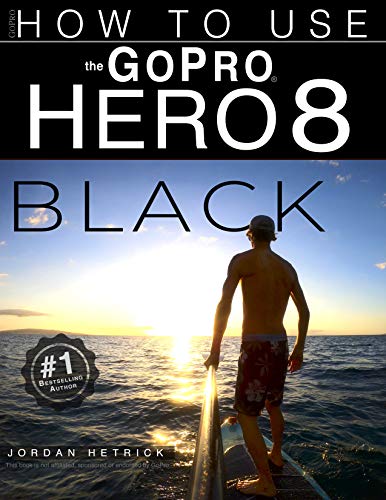 Purchase How to Use the GoPro Hero8 Black from Amazon.com
Purchase How to Use the GoPro Hero8 Black from Amazon.com
Filming with the DJI Magic Mini
Reviewed December 31, by Jon. This could more accurately be described as a booklet rather than a book, which is excusable because the Magic Mini just came out. I did get some useful tips about the mini and its limitations. the book points to a bunch of you tube videos by the author which might be helpful in leaning to do videos with the mini. Thin but a useful introduction.
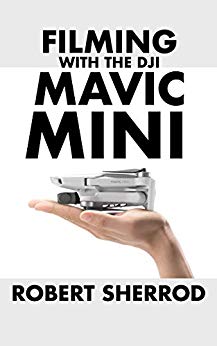 Purchase Filming with the DJI Mavic Mini from Amazon.com
Purchase Filming with the DJI Mavic Mini from Amazon.com
 The Night Fire: A Rene Ballard and Harry Bosch Novel
The Night Fire: A Rene Ballard and Harry Bosch Novel
Reviewed December 27, by Jon. This is Connelly’s second in the Ballard/Bosch line and he is starting to weave the characters together better. This is typical Connelly candy. Entertaining. Ballard is an active robbery homicide detective on the night shift and Bosch is a retired cop who cannot accept retirement. Together they work some cases successfully. This one ends in a real cliffhanger but also with some clues as to the next in the series. There were some dangling ends - like the 11 year old girl who committed suicide early in the book with no apparent follow through or connection to the rest of the book. This was a minor flaw, though. All in all, a great candy 🍬 read.
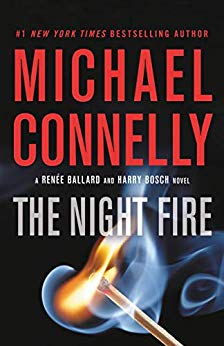 Purchase The Night Fire from Amazon.com
Purchase The Night Fire from Amazon.com
Secret War in Laos, Green Berets, CIA, and the Hmong
Reviewed December 24, by Jon. This book was a disappointment. I read it while in Laos and was looking for insight into the CIA secret war in Laos. The book covered some of this but was really a memoir of Steven Schofield, a special forces medic in Vietnam and later a USAID public health worker in Laos. There were two big flaw with the book, First Schofield made a bunch of gratuitous but irrelevant political comments thorough out the book. He is very right wing - somewhat colored by is Southeast Asia experience - but his comments were unnecessary and detracted from his message. Many were unsubstantiated opinion which he could have more effectively conveyed with a detailed telling of the story of the CIA in Laos. The second flaw was that it was too much about him. He is not a very appealing character and the book focuses on him and his shortcomings - a kind of small minded violent man - and not the context he was in. One minor annoyance is that he talked about everybody he fought with and worked with and described when and how they died. Given the time that has passed, it is inevitable that characters in the book died. We did not need a chronicle of every one’s passing of natural causes. This book had a lot of promise but Schofield did the reader a disservice by writing a memoir rather than a story about what happened. The Ravens is a far better book about the war in Laos.
 Purchase Secret War in Laos from Amazon.com
Purchase Secret War in Laos from Amazon.com
Zen and the Art of Motorcycle Maintenance: An Inquity Into Values
Reviewed December 19, by Jon. Zen and the Art of Motorcycle Maintenance is my favorite book and I have read it many times. The last time I remember reading it was during our trip to Bhutan in 2005 - so it has been almost 15 years. It is really three stories in one. The first is the story of the protagonist on a motorcycle journey across the western US with his son Chris and friends John and Sylvia. His relationship with Chris unfolds over the course of the trip. The second is the story of him prior to his mental breakdown and the intense focus on philosophical ideas that led to the breakdown. The third story - if you can call it that - is the development of his ideas on quality and values. His basic message is that the classic Aristotelian view of the world where we analytically break into parts and relationships is necessary but not sufficient, We also have to see things as wholes. This idea has very much influenced my life and career. Though the book, Pirsig uses the metaphor of motorcycle maintenance to take us beyond the analytical part of fixing the cycle to the gumption part - where we see and understand the whole. I thoroughly enjoyed the book and - even though I know it so well that there were no surprises, it felt like a cliffhanger. Perhaps because I am reading so many candy books on sabbatical, it has an unfair advantage, but I think not. It is just a great book with a profound message that has shaped my life and worldview.
 Purchase Zen and the Art of Motorcycle Maintenance from Amazon.com
Purchase Zen and the Art of Motorcycle Maintenance from Amazon.com
 The Naked Tourist: In Search of Adventure and Beauty in the Age of the Airport Mall.
The Naked Tourist: In Search of Adventure and Beauty in the Age of the Airport Mall.
Reviewed December 16, by Jon. This is yet another cheeky, irreverent travel book in the same spirit as Getting Stoned with Savages. Osborne travels to Borneo via Dubai, Calcutta, the Andaman Islands, Bangkok, and Bali. He plays the hapless traveler looking for adventure and novelty. He seems to be quite interested in prostitution in each culture and very interested in Borneo and the primitive tribes there. Mildly entertaining and insightful, but pretty lightweight. Travel candy.
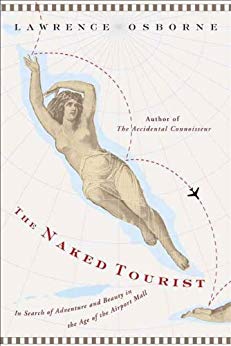 Purchase The Naked Tourist from Amazon.com
Purchase The Naked Tourist from Amazon.com
 Free Melania: The Unauthorized Biography
Free Melania: The Unauthorized Biography
Reviewed December 10, by Jon. Kate Bennett is a CNN reporter who covers Melania Trump. She wrote this unauthorized biography covering Melania’s childhood and pre-Trump years through her stint as First Lady. This is kind of a gossip column book but it did she some new light on Melania Trump. She is more complex than she first appears. While she clearly is Donald Trump’s trophy wife and is realistic about her position and him, she still has a mind of her own and opinions of her own. The word “love” is never used relative to their relationship but she does admire Trump and tries to influence him for good. This is a pretty easy candy read but it does shed some light on an intriguing character. You will respect Melania more after reading this.
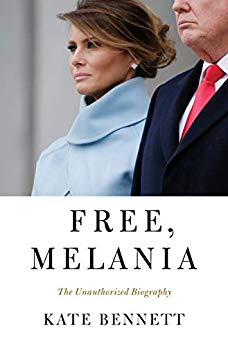 Purchase Free Melania from Amazon.com
Purchase Free Melania from Amazon.com
Elderhood: Redefining Aging, Transforming Medicine, Reimagining Life
Reviewed December 10 by Jon. We met Louise on our 1998 NOLS East Africa Trip. She was a physician from San Francisco traveling solo. When we asked what kind of physician she was she said she was a gerontologist and they were quite rare. Over the last couple of years, we have started seeing writings by her in the New York Times and other places - and then found her book. Elder hood is about growing old and the medical implications. Louise, like many others, is critical of our healthcare system because it really is a medical system, not a patient care system. She looks at healthcare thought the lens of aging. She has lots of stories of her patients and weaves a lot of herself into the book. She describes her journey in becoming a physician and her disillusionment at how poorly the current system services patients - particularly old ones. In some ways, this is pretty common fare but the new here is in viewing healthcare through the lens of older patients and care givers trying to serve them. She also provides good perspective on what it is like to grow old and how to cope with it and maximize enjoying and thriving in elder hood. The book drags on a bit but is still worth reading. It was particularly fun to read given our connection with Louise.
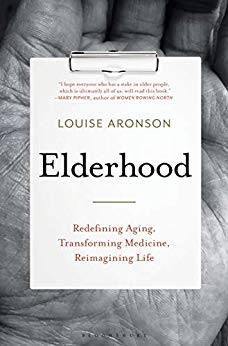 Purchase Elderhood from Amazon.com
Purchase Elderhood from Amazon.com
 Getting Stoned with Savages: A trip through the islands of Fiji and Vanuatu
Getting Stoned with Savages: A trip through the islands of Fiji and Vanuatu
Reviewed December 6 by Jon. This is about a guy who spends time living in the South Pacific - first Vanuatu, then Fiji. He provides some perspective on life in both places and a little bit of Fiji history. It is pretty lightweight travel writing but entertaining as he consumes kava and tries to find the origins of cannibalism. His wife, a development economist has a baby, and they need to move to civilization. - Fiji, after the coup. He describes life there and history. Fun reading while in Fiji, but not particularly deep. Travel candy.
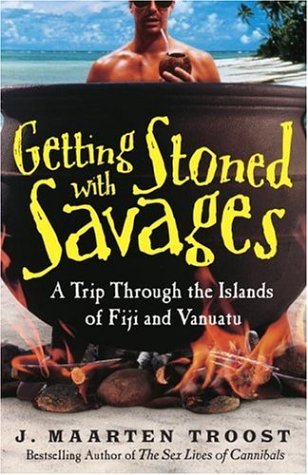 Purchase Getting Stoned with Savages from Amazon.com
Purchase Getting Stoned with Savages from Amazon.com
 The Deserter: A Novel
The Deserter: A Novel
Reviewed December 4, by Jon. This is a typical Demille book - this time written with Nelson’s son Alex. It is about Scott Brodie and Maggie Taylor, US Army Criminal Investigative Division (CID) detectives, sent to Venezuela to apprehend and bring back a former Army Delta Captain who had deserted in Afghanistan. They fly to Caracas and started looking for him, with the help of the US Embassy. As they learn more about what happened in Afghanistan, it becomes less clear who the good guys and bad guys are. They uncover a program called Flagtaff - in which locals were “pacified” in Afghanistan - a play on the Phoenix project in Vietnam. Scott Brodie is the same persona as leading character in almost every recent DeMille book an irreverent, wisecracking, yet competent reprobate. This was definitely candy reading. It as a bit slow going at first, partially because I just read a bit at a time. Once the story got moving, though, it was a cliffhanger. The end did kind of peter out - and he left a number of issues hanging? What happened to the pilot who flew them into the jungle? Will they ever get together? Great beach reading.
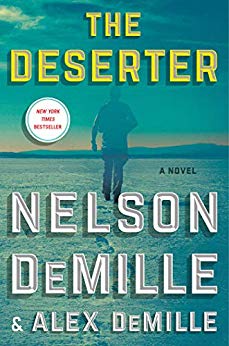 Purchase The Deserter from Amazon.com
Purchase The Deserter from Amazon.com
Why Liberalism Works: How True Liberal Values Produce a Freer, More Equal, Prosperous World For All
Reviewed November 30, by Jon. First off, McCloskey defines liberalism in the economic sense not the commonly used political sense. She defines it as basically free market economics in a libertarian fashion. I wanted to like this book, but her style got int he way. The writing was glib and she has a huge ego - basically saying that every other economist is wrong and she is right. She resorts to name calling int the Fox News style. She makes some good points but her style mutes those points and it seems like she has an axe to grind, rather than putting out carefully reasoned arguments. She postulates that the industrial revolution produced the "great enrichment" through economic liberty. So far so good, but she has a one dimensional view of economics and politics, dismissing all other factors. She is totally bought into free market fundamentalism - which makes her arguments sound ideological not rational and pragmatic. I thought some of her arguments were reasonable but ehr all or nothing style made it hard to take her seriously.
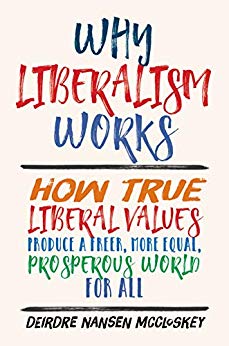 Purchase Why Liberalism Works from Amazon.com
Purchase Why Liberalism Works from Amazon.com
Design Unbound: Designing for Emergence in a Whitewater World - Volume 1
Reviewed November 28, by Jon. This is part of a series that began with Pragmatic Innovation and ends with Design Unbound: Volume 2. This series and this book is a very expansive and ambitious book that tries to create a theory and framing of deisgn practice - based on architectural design. Volume 1 consists of two books - Design Unbound and Designing for Emergence. Design Unbound lays out a basic theory of design covering topics such as iteration, critique, ambiguity, and design skills. Book 2 describes emergence and how to design for emergence using rules. It concludes with the analogy of game design for emergence. I was really excited reading this book because I felt it put much of my design experience and belief into context. That said, I feel like I only scratched the surface of what JBS and Ann were getting at. I look forward to volume 2 and I suspect I will want to re-read or at least refer back to Volume 1. It feels like there is something substantial in these books but it will take some time and effort to absorb.
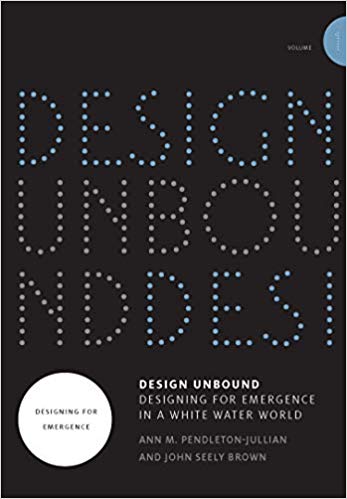 Purchase Design Unbound - Volume 1 from Amazon.com
Purchase Design Unbound - Volume 1 from Amazon.com
The Economist's Hour: False Prophets, Free Markets, and the Fracture of Society
Reviewed November 27, by Jon. Appelbaum is an economics journalist for the New York Times and I've always enjoyed reading his columns. Like Transaction Man, this is a recent economic history of the United States (and to some degree the world). Transaction Man was very focused on a few key ideas whereas The Economists Hour covers a wide swath of economic thought and action - some positive, some negative, some downright destructive. It did put a focus on how much of social and political thought is rooted in economic theories and ideas - and how chaotic the economic intellectual landscape is. There are clearly ideas which are not based in evidence that drove destructive or at the very leasts ineffectual policy decisions. This is a great companion to Transaction Man and helps clarify the intellectual landscape of economics in the late 20th and early 21st centuries. I can only hope it provides a platform upon which to build more rational economic policy moving forward.
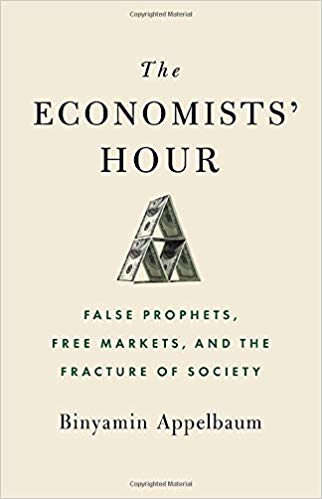 Purchase The Economists Hour from Amazon.com
Purchase The Economists Hour from Amazon.com
The Elements of Thinking in Systems: Use System Architypes to Understand, Manage, and Fix Complex Problems and Make Smarter Decisions
Reviewed November 8, by Jon. This is a companion to The Systems Thinker. It is less about the overall theory of system thinking and more of a how to manual. It runs through a variety of examples and architeypes of systems and talks about how to construct a systems model, diagnose behavior, and fix it. A very pragmatic, although simplistic view of systems thinking.
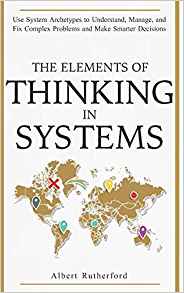 Purchase The Elements of Thinking in Systems from Amazon.com
Purchase The Elements of Thinking in Systems from Amazon.com
Transaction Man: The Rise of the Deal and the Decline of the American Dream
Reviewed October 27, by Jon. Transaction Man is fundamentally about a shift to market fundamentalism that valued an economic view that profit maximization above all else was for the ultimate good of society. He chronicles the move from William Whyte’s 1950s organization man to the 1990s transaction man, in which fealty to large corporations (and the communities they occupy and serve) was replaced by fealty to economic incentives. Lemann describes the lives of three people who influenced this. First was Adolf Berle, a member of Franklin Roosevelt’s brain truest and believer that large corporations were good for society but had to be regulated by the government. The second was Michael Jensen, university professor – first at Chicago, then Rochester, then Harvard Business School. Jensen was strongly influenced by the Chicago School of economists who believed social good was driven by profit maximization. The third was Reid Hoffman – founder of LinkedIn – who represents the Silicon Valley, quasi libertarian view of society. Interwoven with the lives of the three characters, Lemann describes the rise and fall of a south Chicago neighborhood called Chicago Lawn and the rise and morphing of the financial sector from a sleepy sector serving public needs to a voracious transactional machine serving its own needs. Much of this was familiar to me, what was new was the tightly interwoven set of ideas that drove the move toward transactions. I heard about many of the pillars of corporate finance that I studied in business school as complicit in this shift toward transactions. Lemann concludes that big ideas may be what drives political pathology and believes that the interplay of interest groups is what should drive society forward. I tend to agree, but that, in and of itself, may be a big idea.
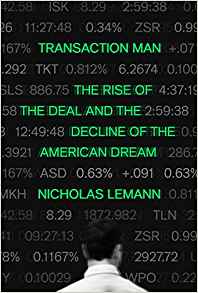 Purchase Transaction Man from Amazon.com
Purchase Transaction Man from Amazon.com
Narrative Economics: How Stories Go Viral and Drive Major Economic Events
Reviewed October 20, by Jon. Schiller is a respected Yale economist whose book describes the power of economic stories or narratives on the actual economy. He starts with the study of contagion – how diseases spread and applies them to stories. He then goes through 10 common narratives and uses keyword analysis to determine when they historically wax and wane.
- Recurrance and mutation
- Panic vs. confidence
- Frugality vs. conspicuous consumption
- The gold standard vs bimetallism
- Labor saving machines replace many jobs
- Automation and artificial intelligence replace almost all jobs
- Real estate booms and busts
- Stock market bubbles
- Boycotts, profiteer, and evil business
- The wage-price spiral and evil labor unions
Schiller is basically making the case for behavioral economics tied to stories. I looked forward to this book and was a little disappointed by it. I like the premise but found it a bit dry and academic. He could have been a better storyteller. Nevertheless, the message is an important one – that economic behavior is not just driven by rationality but by the stories we tell ourselved.
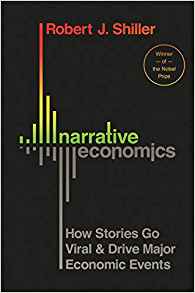 Purchase Narrative Economics from Amazon.com
Purchase Narrative Economics from Amazon.com
Architecture Design Data: Practice Competency in the Era of Computation
Reviewed October 20, by Jon. This book was written by my friend and colleague, Phil, to try to explain the challenges and opportunities that computation technologies have for architectural practice. I’ve known and worked with Phil for almost 20 years, so many of the concepts are familiar to me. What Phil has done with this book is organize the concepts into a coherent set of descriptions and frameworks. Unlike many other books on the role of computers in architecture, Phil’s book looks at this through the lens of architectural practice. This is not surprising since Phil has both been a practitioner and professor of architectural practice at Yale. For those who want to know how practice will be affected by and can leverage technology, this is an important book. My only fear is that practitioners will continue to see technology as a sidecar to practice rather than as a primary vehicle for it. Perhaps that will change as my generation of practitioners retires and a new, more tech-savvy generation takes over. If so, Phil’s book will be an invaluable guide and provocation for those new practitioners.
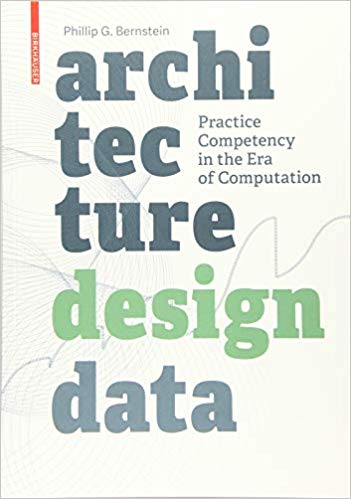 Purchase Architecture Design Data from Amazon.com
Purchase Architecture Design Data from Amazon.com
Retirement Fail: The 9 reasons people flunk post work-life and how to ace your own
Reviewed October 20, by Jon. This book is just what the title says – about the risks of failing (mostly financially) at retirement. It was good to read to remind us of risk and how to mitigate it. A number of the risks – caring for parents, kids collect, etc. are not a factor for us. Nevertheless, the book was good because it forced me to think about risks and mitigation. I felt pretty good about our situation, but it reminds me stay vigilant and plan for the unexpected. This is a reasonable book to read as one approaches retirement.
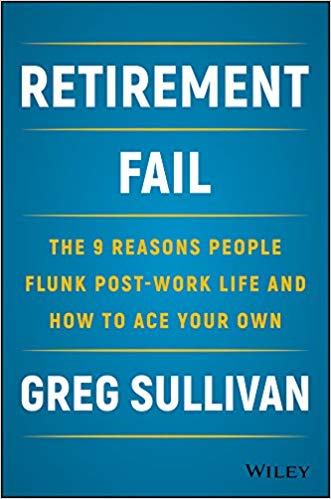 Purchase Retirement Fail from Amazon.com
Purchase Retirement Fail from Amazon.com
101 Things I Learned in Business School
Reviewed October 19, by Jon. Yet another in the 101 Things Series. Like Things I Learned in Architecture School, I actually did go to business school and found most of the concepts familiar. Business concepts are often common sense but it sometimes helps to have a framework around them. More so than the other 101 books, this one might be valuable to a layman. It’s not that business frameworks and theories are not needed, but much of the advice given in the nuggets of information can benefit business folks. Of course, just applying the nuggets is not as effective as having overall frameworks and theories.
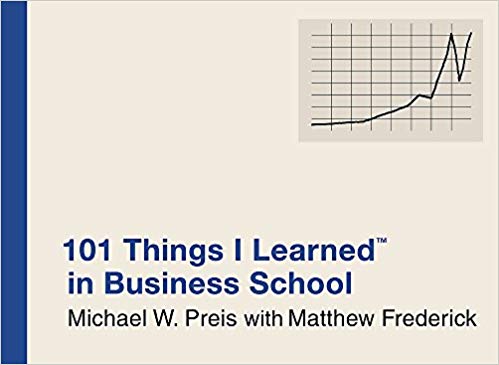 Purchase 101 Things I Learned in Business School from Amazon.com
Purchase 101 Things I Learned in Business School from Amazon.com
Operative Design: A Catalogue of Spatial Verbs
Reviewed October 19, by Jon. I did not actually read this book. There are few words. I purused it. The book is a generative vocabulary of architectural form. It starts with a rectilinear solid (cube) and talks about ways to transform it through a variety of means (verbs). It then shows ways of combining many of the methods. This was a book but could easily be a computer program. Finally, it showed examples of houses that were generated using these methods. Intriquing.
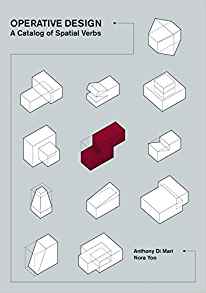 Purchase Operative Design from Amazon.com
Purchase Operative Design from Amazon.com
101 Things I Learned in Urban Design School
Reviewed October 19, by Jon. Still another in the 100 Things series. This one was pretty close to 101 Things I Learned in Architecture School. Urban design closely related to architecture, just at a larger scale and more concerned with the public realm. I really liked this book. It reacquainted me with urban design concepts. Like its peer books, it has useful chunks of information that provide an appreciation for the discipline.
 Purchase 101 Things I Learned in Urban Design School from Amazon.com
Purchase 101 Things I Learned in Urban Design School from Amazon.com
101 Things I Learned in Engineering School
Reviewed October 19, but Jon. This is another in the 101 Things series. I know enough about engineering that I understood most of the concepts. Like the other 101 books, this one breaks down engineering concepts into bite sized chunks. A useful review and appreciation but reading this book will not an engineer make.
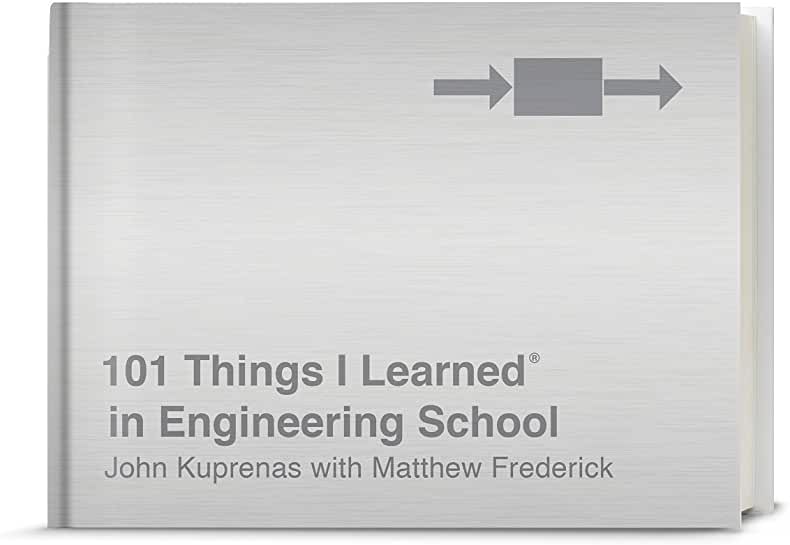 Purchase 101 Things I Learned in Engineering School from Amazon.com
Purchase 101 Things I Learned in Engineering School from Amazon.com
101 Things I Learned in Architecture School
Reviewed October 18, by Jon. This is the original "101 Things I Learned in ... " book. Matthew Fredrick established the format and structure of the entire series. I liked reading the book. Many of the lessons were familiar to me and I wish I had something like it as a reference when I was in architecture school. I found the lessons in small chunks were really useful. I do wonder if it resonated with me because I already knew the domain and these were good reminders, or whether they would make sense without prior domain knowledge. I'm reading several books in the series, such as 101 Things I Learned in Film School, and enjoy them. I hope readers will take these books as glimpses into a field rather than mastery.
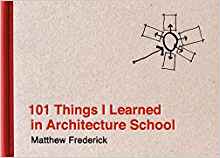 Purchase 101 Things I Learned in Architecture School from Amazon.com
Purchase 101 Things I Learned in Architecture School from Amazon.com
The Systems Thinker: Essential skills for solving problems, managing chaos, and creating lasting solutions in a complex world
Reviewed October 17, by Jon. This is a pretty simple book that is a reasonable introduction to systems thinking. It focuses on the basic principles and gives some concrete examples applying systems thinking to social problems. It is pretty rudimentary but readable and clear.
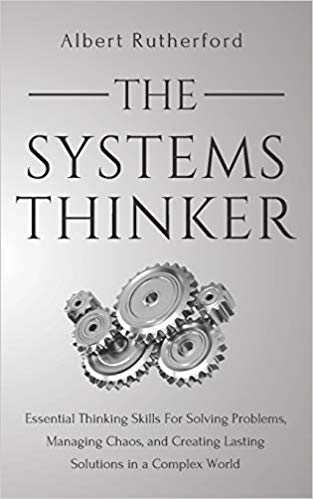 Purchase The Systems Thinker from Amazon.com
Purchase The Systems Thinker from Amazon.com
More From Less: The Surprising Story of How We Learned to Prosper Using Fewer Resources, and What Happens Next
Reviewed October 12, by Jon. McAfee is an economist who writes with optimism about technology and capitalism. His belief is that capitalism drives businesses to use fewer resources – example, we consumer more beverages in metal cans than ever before but we use less material because beverage companies are motivated to make lighter and thinner cans to save cost. Thus we are able to prodce ever-more prospertity with fewer resources. He is hugely technologically optimistic. He covers the agricultural and industrial revolution and describes “dematerialization” as a driver of better. He describes digital technology as one of the drivers of dematerialization. It is a little disappointing that he focuses mostly on optimizing physical things to reduce material (although that plays well with generative design). He did talk about many devices collapsing into one (smart phone) and better ability to track stuff through sensors. I was hoping he’d talk about functions moving from physical to digital (e.g. Tesla). What is really nice about this is that he supports his points with lots of data. His wrting is clear and lucid yet substantiate with data and references. After covering technology, he moves into politics into politics (with an economic lens). He says that the four horsemen of the optimist are tech progress, capitalism, responsive government, and public awareness. In addition to being a tech optimist, he is a capitalism optimist. He draws a continuum of market fundamentalism – social democracy – socialism – communism. He says that the two end points are theoretical constructs that have never existed in the real world (only in Ayn Rand’s mind in the case of market fundamentalism and Karl Marx’s in the case of communism). He asserts that capitalism is a part of social democracy but needs to exist within a strong governance framework. Like his section on technological progress, he backs up his political/economic assertions with good data. In particular, he talks about what Adam Smith really said, rather than what market fundamentalists have cherry picked. He has done a very nice fusion of tech and economic/political thinking. He asserts that the first of the two horsemen - technological change and captialism will move forward without intervention. Responsive government and public awareness need our attention. He particularly asserts the need to rebuild our social capital and create civil and informed discourse. Is evidence from the length of this review, I really liked this book and consider it a must read.
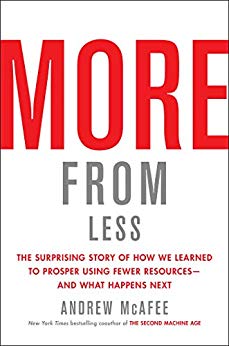 Purchase More From Less from Amazon.com
Purchase More From Less from Amazon.com
The Future of Capitalism: Facing the New Anxieties
Reviewed October 6, by Jon. Collier is a renowned economist who tries to makes sense of where capitalism as gone off the rails. His description correlates with a lot of what I see and read - economics as an overly simplistic view of individuals as rational economic optimizers and of firms as solely focused on shareholder value. Collier advocates for an ethical capitalism where we look beyond simple economic reasoning. So far, so good. It was Collier's prescriptions that I found lacking - not because they did not make sense or I did not agree with them, but because they seemed jumbled and lacked logical coherence. He did start out on a promising tack of finding ways to eliminate (or tax) rent seeking. For example, he said that exhorbitant real estate values in cluster cities - such as San Francisco - come from the overall success of the city, not the individual. He advocates taxing those values to subsidize the development of new clusters. I'm not sure that is the right answer but I did admire Collier's attempt to find rent-seeking that does not add any value to society and root it out. This is an idea which I feel has enormous importance and I wish he took it further. I guess I am a bit disappointed in the book because it showed promise but fell short of an overall coherent prescriptive approach. Maybe he will do that in his next book.
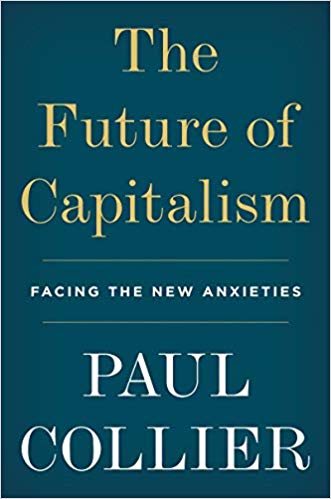 Purchase The Future of Capitalism from Amazon.com
Purchase The Future of Capitalism from Amazon.com
Pragmatic Innovation
Reviewed October 6, by Jon. This books is a short introduction to a new series by Ann and John called Design Unbound - which will ultimately be a five-volume set of books on tools and techniques to unleash the design imagination. Pragmatic Imagination establishes an overall framework for immagination along a spectrum from perception to free-play. They then develop six principles that define how to put imagination to use:
- The imagination serves diverse cognitive processes as an entire spectrum of activity.
- The imagination both resolves and widens the gap betweenthe unfamiliar - the new/novel/strange - and the unfamiliar. This gap increases along the role of imagination in cognitive processes' specrtum from left to right. Within the range of abductive reasoning, there is a shift from using the imagination for sense-making to sense-breaking, where the first widens the gap and then resolves it with imagination.
- The pragmatic imagination pro-actively imagines the actual in light of the meaningful purposeful possibilities and sees the opportunity in everything.
- The pragmatic imagination sees thought and action as indivisible and reciprocal. Therefore it is part of all cogitive activity that serves thought and action for anticipating, and thought and action for followthrough; and the generative/poetic/sometimes-disruptive side of the spectrum is especially critical in a world that requires radically new visions and actions.
- The imagination must be instrumetalized to turn ideas into action - the entire spectrum of the imagination.
- Because the imagination is not under conscious control, we need to understand, find, and design ways to set it in motion and scaffold it throughout meaningful activity.
It is this last principle that the Design Unbound series promises to address. Ann and JSB were participants in Autodesk's Future of Learning Summit in July 2018 and they introduced some of the concepts in the book to us then.
 Purchase Pragmatic Innovation from Amazon.com
Purchase Pragmatic Innovation from Amazon.com
101 Things I Learned in Film School
Reviewed October 4, by Jon. This is nice little book which provides a very quick overview of filmmaking - at least glimpses of what filmmaking is like. I read it just before and after seeing Joker. I love the format of quick little nuggets of information and insight. It provides a nice way of understanding the subject quickly - albeit superficially. This book won't turn you into a filmmaker but will help you appreciate the art of filmmaking and maybe help you see films a little differently.
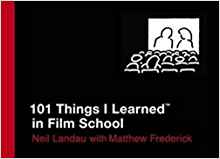 Purchase 101 Things I Learned in Film School from Amazon.com
Purchase 101 Things I Learned in Film School from Amazon.com
Leadership On The Line: Staying Alive Through the Dangers of Change
Reviewed October 2, by Jon. This book provided the framework for the course I took on Leadership for the 21st Century at Harvard's Kennedy School. The initial framing is around technical vs. adaptive problems. Adaptive problems are "wicked" or intractable problems that require change and loss among the participants. The authors provide a lot of advice such as "getting on the balcony" to see a systems view. The cover authority relationships and the limits of authority, the poltical nature of adaptive change, and how -- as a leader -- stay sane and grounded while leading adaptive change. It was very helpful to read the book after taking the class because it grounded the concepts taught in the class. I'm not sure I would have read it without taking the class but it is a great reminder of the things I learned in class.
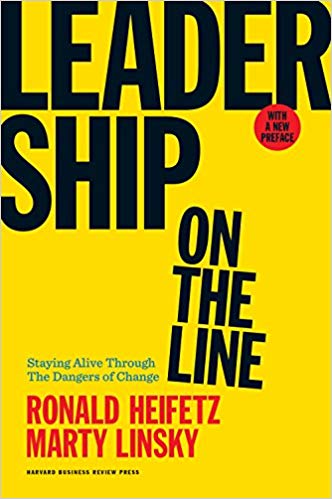 Purchase Leadership on the Line from Amazon.com
Purchase Leadership on the Line from Amazon.com
Shadowlands: Fear and Freedom at the Oregon Standoff
Reviewed September 22, by Jon. This book is about the 2016 "Oregon Occupation" in which a right wing group associated with Cliven and Ammon Bundy, occupied the Malheur National Wildlife Refuge in Oregon. The book is both the occupation and the trials. It is not particularly sympathetic to the the right-wing activists who oppose the US Government, but he does get into the background of why they hold their beliefs. He ties their beliefs to the economic crash, raceism, environmentalism, libertarianism, the Mormon religion, western land-use conflicts, the constitution and the white nationalism that gave rise to the Trump election. But he also compares their occupation to the Native American protests and the police actions that led to Black Lives Matter. The book is a big sprawling book, that covers a lot of ground. It raises more questons than it answers. It does put more nuance on the events and people that led to the occupation than the press does.
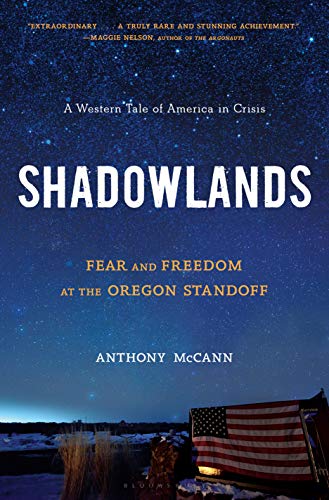 Purchase Shadowlands from Amazon.com
Purchase Shadowlands from Amazon.com
TED Talks: The Official TED Guide to Public Speaking
Reviewed September 12, by Jon.This is a pretty complete book on how to give a great talk, TED style, by Chris Anderson, the curator of TED. I often hear people say they want to hear a "TED talk" with little idea of what goes into making a great talk. Chris provides the ingredients and peppers the book with examples of great talks - many of which I have seen. He demystifies what makes a great talk - and does get the point across that it is a lot of work and deliberate effort to produce the quality of a TED talk.
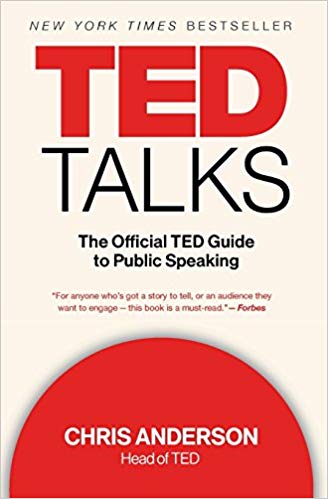 Purchase TED Talks from Amazon.com
Purchase TED Talks from Amazon.com
The Second Curve: Thoughts on Reinventing Sociey
Reviewed September 2, by Jon. I've read Charles Handy before - 20 or more years ago - so I was looking forward to what Handy, now in his 80s, had to say. The metaphor of the second curve is that everything reaches a peak and one has to jump off the curve at its peak and start a second curve. Handy uses this metaphor to address a bunch of topics such as shareholder value, organizational purpoe, corporate governance, politics, and education. Lots of pretty familiar laments and prescriptions, well framed by the second curve metaphor.
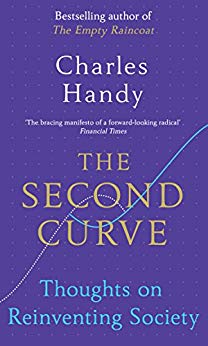 Purchase The Second Curve from Amazon.com
Purchase The Second Curve from Amazon.com
Drawdown: The Most Comprehensive Plan Ever Proposed to Reverse Global Warning
Reviewed August 27, by Jon. The title kind of says it all. Drawdown is a comprehensive inventory of techniques from energy to building to agriculture, to land use, to food, and more - of techniques to slow or reverse global warming. It is the output of a large research project on reversing global warming. It is a bit dense at times but well written and well produced. There are short descriptive essays with photos and examples for each technique. Each technique is quantified as to carbon reduction, cost, and savings. This is a serious book. Hawken edited but a number of people wrote.
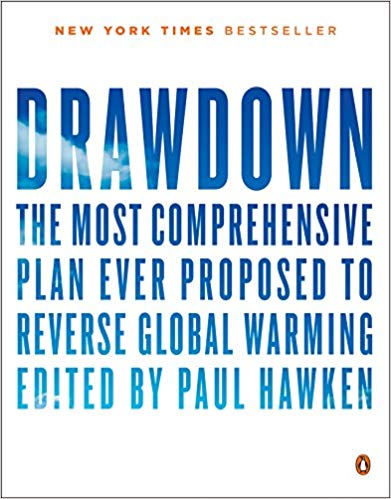 Purchase Drawdown from Amazon.com
Purchase Drawdown from Amazon.com
 Rich People Problems: A Novel
Rich People Problems: A Novel
Reviewed August 20, by Jon. This is the third in the Crazy Rich Asians trilogy, right after China Rich Girlfriend. It completes the story of the Nick Leong. The matriarch of the family, Nick's grandmother dies, and they heirs have to figure out how to save the family mansion (or get rid of it). Like the rest of the series, it is a candy read with lots of gossip, brand envy, and tales of the idle Singapore rich. Entertaining but mindless. Good summer reading.
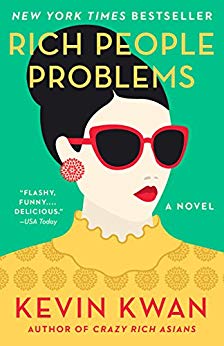 Purchase Rich People Problems from Amazon.com
Purchase Rich People Problems from Amazon.com
Platform Revolution: How Networked Markets are Transforming the Economy - And How to Make Them Work for You
Reviewed August 10, by Jon. At first, this book was a bit slow describing platforms in a very general way, but it got better describing the difference between traditional "pipeline" companies and platform companies. The later parts of the book on strategy and policy were particularly good. I had to push through the somewhat slow beginning but I'm glad I did. The book starts to lay out how to think strategically about platform-based business.
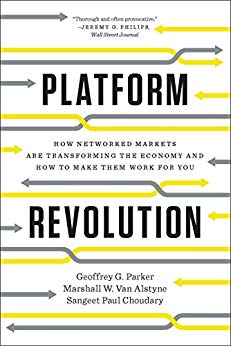 Purchase Platform Revolution from Amazon.com
Purchase Platform Revolution from Amazon.com
The Power of the Dog
Reviewed August 10, by Jon. The Power of the Dog is the first in a series of three novels about Mexican drug cartels. Art Keller is a DEA agent who is the protagonist. The book wends its way through Mexican drug cartels, the CIA, the DEA, Chinese arms dealers, Irish gangsters, and prostitutes. It is very convoluted and difficult to follow the story – which is probably intentional. There were lots of twists and turns and challenges figuring out who was stabbing who it the back. By the end, things got clear, but it was a challenge to follow. I presume this will tee me up for the next two novels – the Cartel and the Border. I hope things will become clearer.
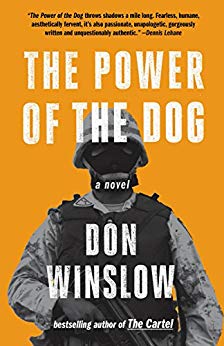 Purchase The Power of The Dog from Amazon.com
Purchase The Power of The Dog from Amazon.com
Non-Bullshit Innovation: Radical Ideas From the World’s Smartest Minds
Reviewed August 9, by Jon. David is the founding editor of Wired UK and a friend of Autodesk. When I first heard of his new book, I immediately thought “oh, no not another me-too book about innovation”. The intro talked about innovation poetry or innovation porn – people who talk a lot about innovation but never do it. This is rampant in silicon valley and among some of my friends and colleagues. You know who you are! Rowan talked about the phenomenon of the innovation tour of silicon valley – where execs from old school companies tour silicon valley to learn about innovation. I’ve spoken to many such tours. So I was skeptical. My skepticism, however, was misplaced. David’s book is full of new and refreshing examples of innovation. Each chapter is built upon an innovation theme and uses evocative stories to illustrate the theme. Each chapter culminates in a set of lessons around the theme. My usual advice is to avoid books on innovation because they are so stale and tepid. This is the counter-example. David’s book offers new insights and compelling stories. He has reinvented the genre. Read it.
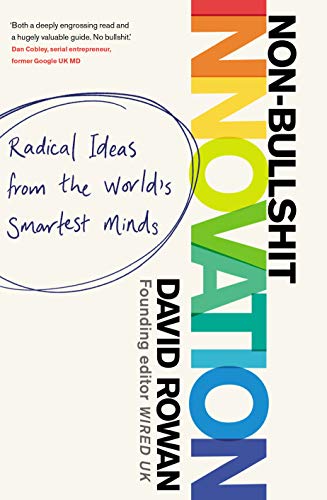 Purchase Non-Bullshit Innovation from Amazon.com
Purchase Non-Bullshit Innovation from Amazon.com
How to Win in a Winner-Take-All World: The Definitive Guide to Adapting and Succeeding in High-Performance Careers
Reviewed July 23, by Jon. I read this book solely because it was written by Neil Irwin. I am past the stage in my career where I am seeking career advice, but I really like Irwin, who is one of the economic writers for the New York Times. I loved the book. It did provide career advice but, more importantly discussed the changing nature of work. It was both a lucid explanation of how work is changing and contained good prescriptions of what to do about it. So it was both an economics tract and a career help book. Irwin has a very clear writing style and did something more authors should do - he provided a summary of each chapter at the end of the book. Kind of cliff notes for the book. A lot of books like this are really an article expaneded into a book. I did not feel that way about this book. The entire book was worthwhile and the summary at the end just reinforced the messages throughout the book. Worth reading.
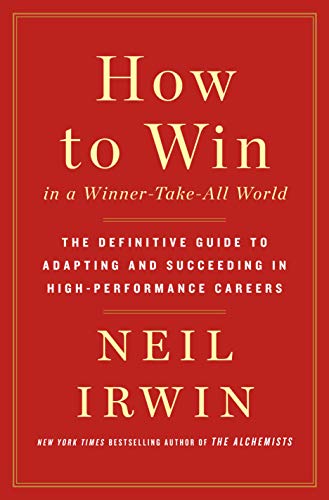 Purchase How to Win in a Winner Take All World from Amazon.com
Purchase How to Win in a Winner Take All World from Amazon.com
The Algebra of Happiness: Notes on Pursuits of Success, Love, and Meaning
Reviewed July 23, by Jon. Scott Galloway is a brand strategist and much of this book is about building one brand - that of Scott Galloway. It has some good advice on life. The lessons were reasonable but the book did remind me of Tim Ferris Tools of Titans. Some good advice but a lot of trumpeting his own horn - which detracts a bit from the advice.
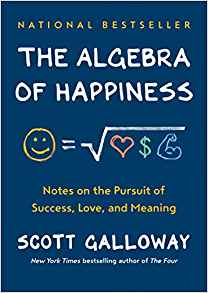 Purchase The Algebra of Happiness from Amazon.com
Purchase The Algebra of Happiness from Amazon.com
Writing to Persuade
Reviewed July 15, by Jon. Trish Hall is the former New York Times Op-Ed page editor. This is a pretty succinct and clear book about how to write succinctly and clearly 😊. She interweaves her life story and experience at the times with 15 principles of creative writing:
- Listen to people.
- We believe what we believe.
- Respect your audience. Learn to be empatheic.
- Don’t get into fights.
- Play on feelings.
- Understand moral values.
- Emphasize your similarities.
- What do you know?
- Surprise your reader.
- Be specific.
- Tell stories.
- Facts aren’t magic.
- Facts do matter.
- Abandon jargon.
- Prune ruthlessly.
This book was well written with good advice. Additionally, it provided a rare glimpse behind the scenes of an institution I very much respect and admire – the NYT Op-Ed page. Well worth reading.
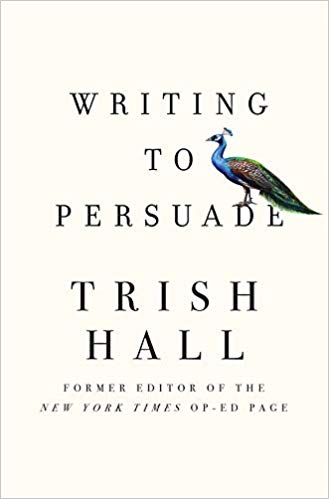 Purchase Writing to Persuade from Amazon.com
Purchase Writing to Persuade from Amazon.com
Traveler's Tales Tibet
Reviewed July 11, by Jon. This is part of the popular Travelers Tales series - with short stories from a variety of authors about a particlar region. We went to Tibet a couple of years ago and have been to Ladakh, Bhutan, and Nepal - so are quite familiar with the Himalayan region. The book was fun and entertaining. Even though most of our time in Tibet was in Lhasa, the stories had enough color to imagine what the rest of Tibet is like. Pretty entertaining and brought back good memories of Tibet.
 Purchase Travelers Tales Tibet from Amazon.com
Purchase Travelers Tales Tibet from Amazon.com
Act Like a Leader, Think Like a Leader
Reviewed July 9, by Jon. This book was ok, but not great. It takes a behavioral approach to leadership and focuses on acting in a bigger context. This is, according to the author, in contrast to most leadership books which implore you to change your thinking. This book implores you to change your actions. It was OK as far as it goes. Perhaps I am at the point in my career where it is less relevant. The book was an easy read, but I felt unfulfilled.
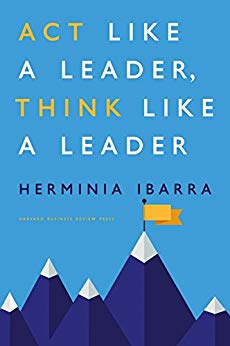 Purchase Act Like a Leader, Think Like a Leader from Amazon.com
Purchase Act Like a Leader, Think Like a Leader from Amazon.com
 King of Kings
King of Kings
Reviewed July 7, by Jon. Yet another saga in Smith's series on the Courtney and Ballantine families. This one is about Ryder Courtney who sets up a silver mine in Ethiopia and Penrod Ballantye, British soldier who is engaged to Courtney's sister-in-law. It has the usual twists and turns and predictable outcomes of a Wilbur Smith novel. Pretty lightweight fare, but entertaining summer reading.
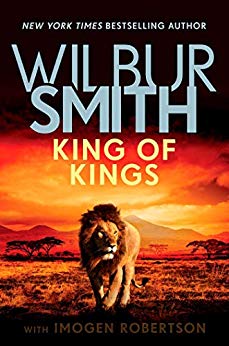 Purchase King of Kings from Amazon.com
Purchase King of Kings from Amazon.com
Not Working: Where Have All the Good Jobs Gone
Reviewed July 4, by Jon. This book was a disappointment. Blanchflower is a labor economist and I thought the book would provide new insights into the job situation. It did not. Most of what he wrote is pretty well known. His fundamental thesis is that the demand for labor is soft - a problem in the demand environment but not fundamentally caused by automation or globalization. They are contributory factors, but not the cause. He did find that home ownership supresses employment - perhaps because it supresses labor mobility. The book had lots of economic analysis but was not well crafted. It wandered from dry economic analysis to political rants. Although I agree with most of what he wrote, he did not provide new insights and the book seemed disorganized and scatterhot. I expected better.
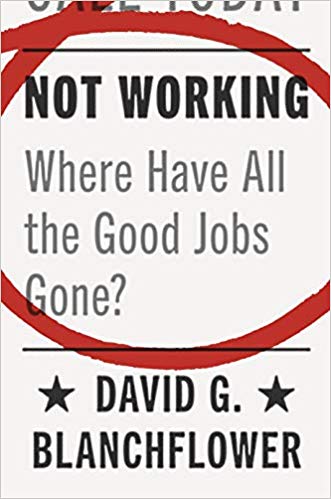 Purchase Not Working from Amazon.com
Purchase Not Working from Amazon.com
Crashed: How A Decade of Financial Crisis Changed the World
Reviewed June 29, by Jon. Crashed is an exhaustive history of the financial crisis - from its roots in the early 2000s to the present day. Tooze exhaustively chronicles the crisis on a worldwide basis - showing how interlinked the global economy is and how pivotal a role the US had in recovery. It is very clear from Tooze's accounting that the stimulus could have been larger for a more vigorous recovery and regulation of the banking sector needs to be much stronger than it has been to prevent a repeat performance. The book ends with Donald Trump taking office and vowing to reign in the banks. He has done anyting but. Sad. This book is pretty consitent with others I have read. It is very long and exhausive and covers Europe in much more depth than other books about the crisis. Well written but takes a commitment to get through.
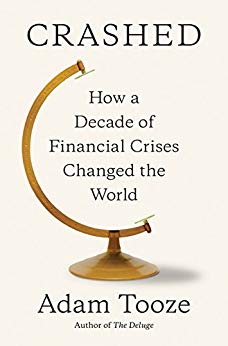 Purchase Crashed from Amazon.com
Purchase Crashed from Amazon.com
 The Fallen
The Fallen
Reviewed June 17, by Jon. This is another in Baldacci's Memory Man series. Amos Decker and an FBI and DEA team unravel the mysery of a small town in Pennsylvania that was developed by one family and has fallen into opiod abuse crisis. Entertaining but lightweight.
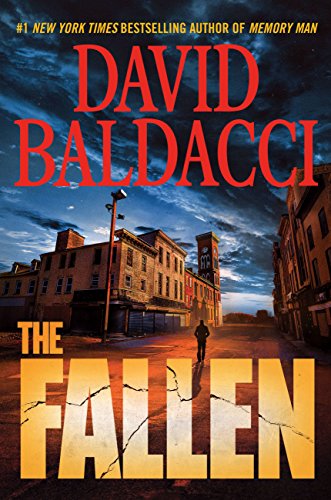 Purchase The Fallen from Amazon.com
Purchase The Fallen from Amazon.com
A Gentleman in Moscow: A Novel
Reviewed June 13, by Jon. This is about a Russian count who is sentenced in 1922 to house arrest in Moscow's Metropole hotel for alledgedly writing a seditious poem. He moves from a sumptuous suite to an attic room. THe book is about his life, with a few unexepected turns such as a young girl he has to raise as his daughter. The book is well written, but a little pointless. It is fun to read but kind of long and not much of a message. Entertaining but a bit long and slow.
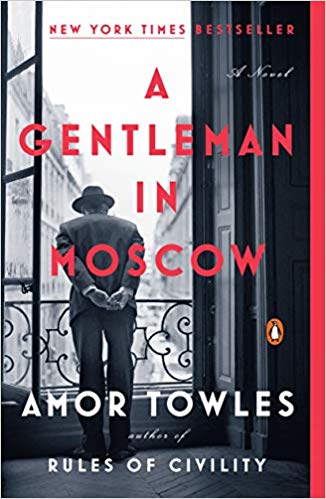 Purchase A Gentleman in Moscow from Amazon.com
Purchase A Gentleman in Moscow from Amazon.com
Capitalists Arise! End Income Inequality, Grow the Middle Class, Heal the Nation
Reviewed June 13, by Jon. Georgescu is a Romanian refugee who became the chairman of advertising firm Young and Rubicam. He makes the argument that capitalism is broken - the over financialization of the economy and the singular focus on shareholder value is driving income inquality and a bunch of other dysfunction. This argument has been made elsewhere. This book succinctly summarizes the arguments. The big difference, though is that Georgescu argues that only capitalists can save capitalism. He asserts that CEOs need to band together and reform capitalism. I love his argument, but am skeptical that those who benefit greatly form the present system will reform it. His heart is in the right place. Time will tell if the execuive class heeds his argument.
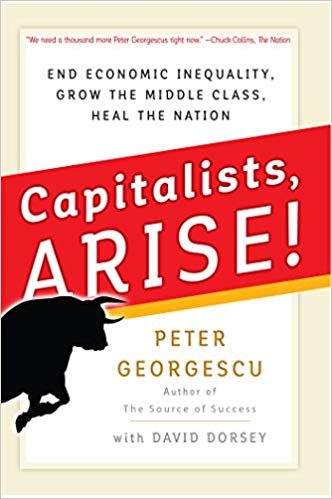 Purchase Capitalists Arise from Amazon.com
Purchase Capitalists Arise from Amazon.com
An Economist Walks Into a Brothel: and other unexpected places to understand risk
Reviewed June 9, by Jon. Schrager is a retirement economist and wrote this book to describe risk. She goes to unusual places - a brothel, professional surfing, the military, and the movie business - to describe risk and how it is handled. She then talks about ways to deal with risk - diversification, hedging, and insurance. The book is usefu and entertaining. Nothing profound here but a good coverage of risk and its mitigation is straightforward, layman's terms.
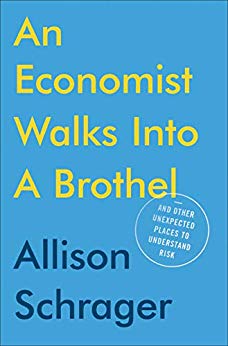 Purchase An Economist Walks Into a Brothel from Amazon.com
Purchase An Economist Walks Into a Brothel from Amazon.com
This America: The Case for Nation
Reviewed June 5, by Jon. Lapore is an American Historian who wrote These Truths. This America is a short book, expanded from an essay that bascially says historians abandoned the study of the nation. There used to be a lot of debate about what the nation is - bracketed between a liberal, inclusive view of the nation and a darker, more exclusionary view of the nation - at the extreme side - white nationalism. Lapore advocates once again studying the nation - to reclaim the more liberal and inclusive view of what it means to be a nation.
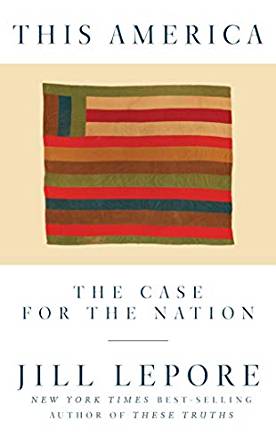 Purchase This America from Amazon.com
Purchase This America from Amazon.com
The Second Mountain: The Quest for a Moral Life
Reviewed June 3, by Jon. Brooks describes most peoples lives as characterized by two mountains – the first is about recognition and personal achievement. The second is about relationships and giving back. So far so good. Like a lot of business books (which this is not), the gist of the idea comes across in the first couple of chapters and the rest seems like filler. Brooks talks about religion, marriage, and community building. It was kind of rambling. I like the point he is trying to make. I just wish he made it more succinctly.
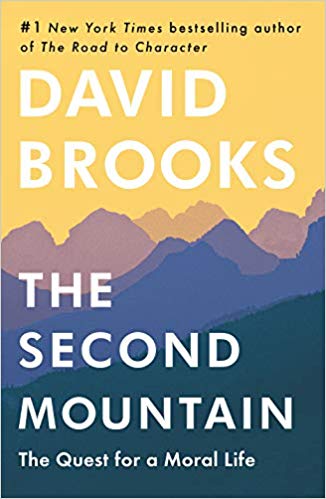 Purchase The Second Mountain from Amazon.com
Purchase The Second Mountain from Amazon.com
Upheaval: Turning Points for Nations in Crisis
Reviewed May 27, by Jon. DIamond looks at seven nations - Finland, Chile, Japan, Indonesia, Germany, and Australia -- all places he has lived and all which adapted in response to a crisis. He looks at these places through the lens of how individuals adapt to crisis using the following techniques:
- Acknowledgement that one is in crisis
- Acceptance of One's personal responsibility to do something
- Building a fence, to delinieate one's individual problems needing to be solved
- Getting material and emotional help from other individuals and groups
- Using other individuals as models of how to solve the problem
- Ego strength
- Honest self-appraisal
- Experience of other personal crisis
- Patience
- Personal flexibility
- Individual core values
- Freedom from personal constraints
He goes through a history of each country and its specific crisis and then tries to generalize his principles to Japan, the US, and the World. He addresses both advantages and challenges for each. The US challenges he cites are the accelerating deterioration of political compromise, voting, election finanicing, and inequality. For the world, he focus on nuclear weapons, climate change, resource depletion, and inequality. For each level of scale, he use his individual crisis framework as an analytical tool. It was somewhat effective, but also somewhat forced. Other reviewers have noted factual inaccuracies and force-fitting the framework. Nevertheless, Diamond is a credible source who has provided insight into how civilizations evolved and deal with crisis. This book did the same. It was a good book, not a great book, but did add to the body of knowledge about societies and culture with some hints as to the path forward.
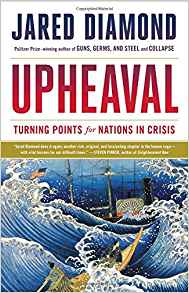 Purchase Upheaval from Amazon.com
Purchase Upheaval from Amazon.com
Win Bigly: Persuasion in a World Where Facts Don't Matter
Reviewed May 26, by Jon. I wanted to like this book because I thought it would provide insight into how such a fact-free politician as Trump could capture the imagination of the American people. The book attempted to do that but it was marred by excessive self-promotion "I'm a trained persueder" by Scott Adams, the cartoonist who created Dilbert. Adams says he is not endorsing Trump's policy decisons but admires his persuasive techniques. Fair enough. Adams does articulate how Trump persuedes, and the technique undoubtedly work. What was disturbing, aside from the self-promotion, was an admiration for the deception inherent in the persuasion. The book seemed espouse a freedom from moral or rational considerations and admire persuasion for its own sake. Adams says, for example, that Trump is a an accomplished business person and negotiator - ignoring the evidence that he is a poor businessman and actually a master chartitan and manipulator. Adams is probably correct in is assessment of Trumps persuasive abilities, but could have cast a more critical eye on the impact of his persuasion.
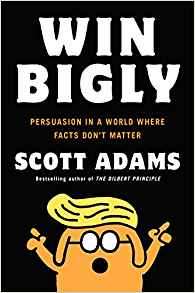 Purchase Win Bigly from Amazon.com
Purchase Win Bigly from Amazon.com
People, Power, and Profits: Progressive Capitalism for An Age of Discontent
Reviewed May 12, by Jon. I have read Stiglitz for many years. He is definitely on the progressive side of economics. I used to worry that he was a critic of unfettered globalism, but I am no more. Stiglitz makes the strong case that markets, left to themselves, create inequality, fail to protect the environment, and underinvest in long-term productive capacity, things like infrastructure, education, and research. He is a critic of both supply-side economics and the belief that government should be as small as possible. He is an unabashed believer that markets, left to themselves, create market failure and an advocate of government intervention to address market failures and invest in long-term productive capacity. He has several policy prescriptions, most of which I agree. Stiglitz has been saying these things for a long time. The book does not offer a lot of new – but does crystalize a strong view of progressive economics and capitalizm. It is consistent with Stiglitz’s historical views and pulls together lots of threads of thought into a coherent economic narrative
 Purchase People, Power, and Profits from Amazon.com
Purchase People, Power, and Profits from Amazon.com
The Emperor of All Maladies: A Biography of Cancer
Reviewed May 5, by Jon. The Emperor of All Maladies is just what the title says, a biography of cancer. It covers a long arc of history as researchers and clinicians try to figure out causes, cures, and prevention of cancer. Initially I was disappointed, because I wanted to read about what cancer is and how it can be addresses. However, as I read the book, I realized what I was looking for was best explained by tracing the arc of cancer research. I still came away with more questions than answers, but the book does a good job of showing how those dedicted to fighting cancer work, and the progress they have made.
 Purchase Emperor of All Maladies from Amazon.com
Purchase Emperor of All Maladies from Amazon.com
Dying of Whiteness: How the Politics of Racial Resentment is Killing American's Heartland
Reviewed April 22, by Jon. The title is not totally accurate. Dr. Metzl is a physician who does three in-depth scientific studies about why rural white America votes against its own interests. He starts in Cape Girardeau, Missouri. A place with a huge gun culture and an equally huge problem of gun-inflicted suicide. Missouri had relatively resricted gun law which have recently been relaxed Metzl compares Missouri against Connecticut (which still has strict gun laws) and found, no surprise, that Connecticut has a lower rate of gun-inflicted suicide. He then goes to Tennessee and finds that blacks value government provided health insurance while whites resist - even though they have conditions which warrent it - because they don't want blacks to get "free benefits". Finally he goes to Kansas - which used to have an exemplary public school system that was decimated with Sam Brownback's experiments in fiscal austerity. I say the title is not totally accurate becase it paints a picture broader than racial resentment - although that is a big theme. The book is well written and Metzl brings a scientific method and physician's logic to his topic.
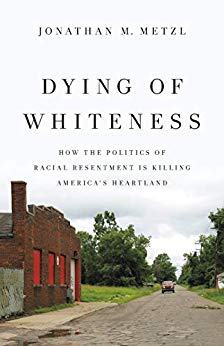 Purchase Dying of Whiteness from Amazon.com
Purchase Dying of Whiteness from Amazon.com
Accelerate: Build and Scaling High Performing Technology Organizations
Reviewed April 21, by Jon. This book was recommended by the executive in charge of cloud services for Autodesk. The big premise was that some of the things we used to do are no longer as effective in a devops world and to measure everything. I thought the message was fine but the book was a bit lightweight. It oculd have had more meat and gone into more depth. I skimmed in an hour and got the gist. This could have easily been an article rather than a book.
 Purchase Accelerate from Amazon.com
Purchase Accelerate from Amazon.com
Deep South: Four Seasons on Back Roads
Reviewed April 13, by Jon. Thoreux travels all around the southern United States in all four seasons. The book is a series of short stories or vignettes, each of which describes some aspect of the south. The stories really described the texture of the south. They do get a little repetitive however. Recommended reading to understand this part of the U.S.
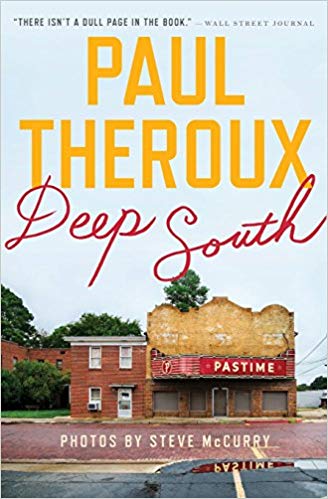 Purchase Deep South from Amazon.com
Purchase Deep South from Amazon.com
Innovation Killers: How Financial Tools Destroy Your Capacity to Do New Things
Reviewed April 7, by Jon. This is more of a pamphlet than a book. It is a single Harvard Business Review classic article. The premise of the article is that three key financial tools actually subvert strategy by emphasizing continuity rather than growing new opportunities. The authors point to:
- Discounted Cash Flow and Net Present Value
- Using Fixed and Sunk costs unwisely
- Focusing myopically on earnings per share.
The authors make the case that business schools teach finance and strategy separately and the financial tools overweight continuity of present business rather than the optionality of growth opportunity. Further they overweight the known rather than risky new growth. There was a lot of insight packed into this little book. One bonus was the notion that the focus on shareholder value is misplaced (something widely chronicles elsewhere). They authors assert that the short term focus of financial firms means that they don’t have a long-term view as owners but are actually short-term agents. The whole shareholder value notion was developed to address the agency problem (owners and managers have divergent interests) but financiers are no longer owners, but agents. We thus have an agent-agent problem. The managers and employees of a company are those who have a long-term interest, which is being subverted by the financial community. This is a small book with lots of power. It is well worth reading.
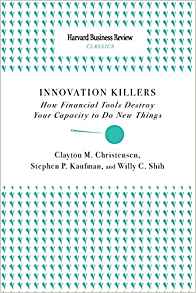 Purchase Innovation Killers from Amazon.com
Purchase Innovation Killers from Amazon.com
Social Security - The Inside Story, Silver Edition
Reviewed April 6, by Jon. This is billed as the absolute social security bible. It is a reasonably easy to follow and complete guide to Social Security. Like other books on social security, it suffers some from trying to overly cover all cases - thus making a simple path through social security needlessly complex. Needless to say, it did have a lot of good information. I just had to work to figure it out.
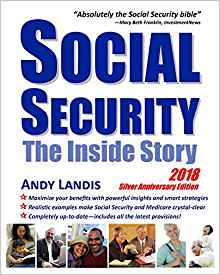 Purchase Social Security - The Inside Story from Amazon.com
Purchase Social Security - The Inside Story from Amazon.com
 The Last Mile
The Last Mile
Reviewed April 2, by Jon. This is the second in the Memory Man series. I am reading them out of sequence. This book is about Melvin Mars, former football player, who is on death row in Texas. Decker and the FBI team figure out that he was framed for the murder of his parents. Like most of these there is a kind of improbable story that twists and turns with a surprise ending. It does establish the relationship between Melvin Mars and Decker. A candy read. Entertaining but pretty light on content. I formerly read The Fix, which follows The Last Mile in the series.
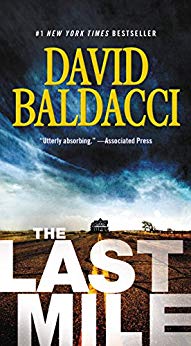 Purchase The Last Mile from Amazon.com
Purchase The Last Mile from Amazon.com
Get What's Yours for Medicare
Reviewed March 24, by Jon. This book is a companion to Get What's Yours: The Secret to Maxing Out Social Security. It walks through the many arcane rule of Medicare and explains how to ensure proper coverage. I wish the book was simpler, but that is probably the fault of the medicare program, not the book. All of these books would be more helpful if they showed the options in tabular or decision tree form. All of the raw in formation is there but it is left up to the reader to parse it.
 Purchase Get What's Yours for Medicare from Amazon.com
Purchase Get What's Yours for Medicare from Amazon.com
The Third Pillar: How Markets and The State Leave Community Behind
Reviewed March 18, by Jon. Rajan is a respected academic and government offical. He was former IMF chief economist, ,head of India's central bank, and author of Fault Lines - about some of the causes of the finanical crisis. Rajan's basic premise is that society needs three pillers - the market, government, and community - to function correctly. In modern times, the market and government have crowded out community. Rajan traces the history of government and markets and shows and epic struggle for supremicy between the two. He then talks about the role community could and should play in society and offers some prescriptions. Rajan is from the University of Chicago - which is a bastion of the market oriented approach. Like his last book, I was glad to see this one well reasoned and balanced. Worth reading.
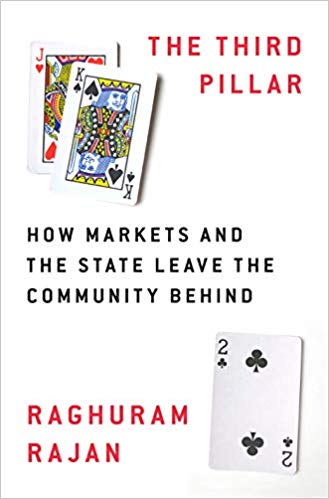 Purchase The Third Pillar from Amazon.com
Purchase The Third Pillar from Amazon.com
Prime Movers of Globalization: The History and Impact of Diesel Engines and Gas Turbines
Reviewed March 18, by Jon. Vaclev Smil is an academic who writes very data rich and intriguing books about technology. This book starts with the history of the diesel engine (its invention and tracing its developent. It then goes on to describe how diesel engines are pervasive in everyday life and society. He goes into detail about how diesel engines power shipping. He does a similar development for gas turbines that power jets. Ultimately he shows how critical both diesel engines and gas turbines are to moving people and stuff - the basis for globalization. Smil's books are chock full of statistics and data to really drive home, quantitatively, the impact these technologies have.
 Purchase Prime Movers of Globalization from Amazon.com
Purchase Prime Movers of Globalization from Amazon.com
Homo Deus: A Brief History of Tomorrow
Reviewed March 9, by Jon. Homo Deus is the third Harai book I have read after Sapiens and 21 Lessons for the 21st Century. This book is about the future. Harari in his usual clear and provocative style, postulates what the future might be like. He claims that we have concqured plague, famine, and war - the scourges on humanking until now - and postulates what the future might hold for us as a species. He builds on his idea in Sapiens that we are defined by the stories we tell ourselves. He dissects the stories of capitalism, socialism, and humanism. He believes we might need to figure out what humans are good for in an age when automation can do many of the things we had to do for survival. In a world defined by information - both biological and digital - he postulates new stories that might define our existence. The big challenge is that we might not control these stories - but just be minor players in them. A very provocative read.
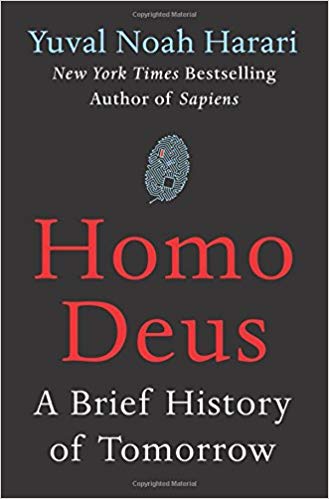 Purchase Homo Deus from Amazon.com
Purchase Homo Deus from Amazon.com
 Memory Man
Memory Man
Reviewed March 8, by Jon. This is the first in Baldacci’s series about Amos Decker, the ex football player who became a memory savant when he took a big blow during a pro football game. This novel establishes why and how Decker’s family was murdered and how he left his job as a policeman and patrolman and gets connected with the FBI as a special consultant. It starts with someone falsely “confessing” to Decker’s family murder at the same time as a mass shooting at a high school. The plot has lots of twists and turns and moves pretty fast. Much of it is implausible but it is entertaining. I formerly read The Fix, which is earlier in the series. Memory Man provided a lot of context.
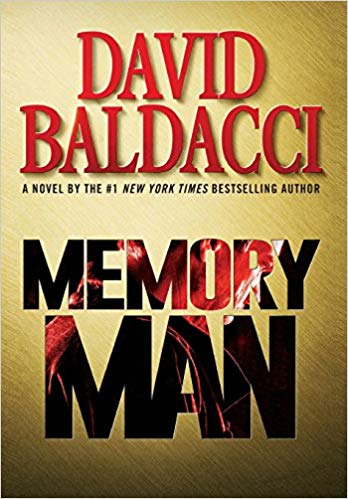 Purchase Memory Man from Amazon.com
Purchase Memory Man from Amazon.com
Rock Retirement: A Simple Guide to Help You Take Control and Be More Optimistic About The Future
Reviewed March 6, by Jon. Whitney is a financial planner who asserts that too many people see planning for retirement as a math problem rather than a life planning problem. He does offer some financial advice but his biggest contribution is to help people think about clarifying their values and understand what they really want out of retirement, then figure out the math. Sage advice.
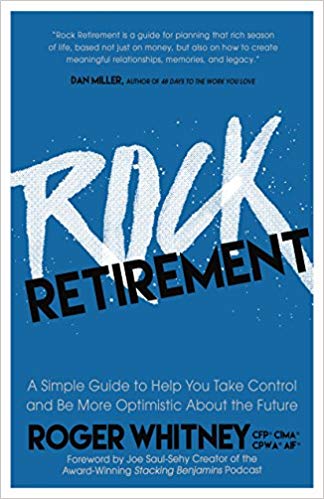 Purchase Rock Retirement from Amazon.com
Purchase Rock Retirement from Amazon.com
 Adventures in Retirement: A hilarious journey into the unknown world of excess time, limited responsibilities, and an uncertain future
Adventures in Retirement: A hilarious journey into the unknown world of excess time, limited responsibilities, and an uncertain future
Reviewed March 3 by Jon. Doyle is about to retire and is thinking about what he will do in retirement. Each chapter is about a different activity – golf, yoga, cooking lessons, kayaking, travel, bowling…. that he might embark on. He is a comedy writer so it is pretty tongue-in-cheek. Nevertheless as someone contemplating retirement, he does provide some food for thought.
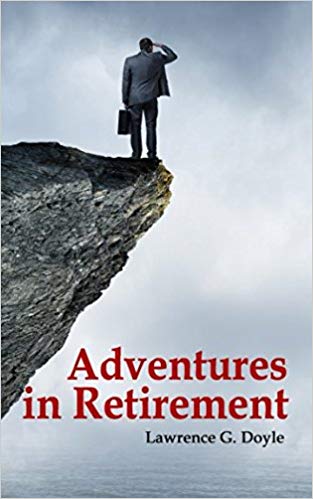 Purchase Adventures In Retirement from Amazon.com
Purchase Adventures In Retirement from Amazon.com
Killers of the Flower Moon: The Osage Murders and the Birth of the FBI
Reviewed March 3, by Jon. This is about the Osage Indian tribe in Oklahoma. When the Osage were driving to Oklahoma, it turns out they occupied very oil-rich territory. Each Osage was entitled to money from the oil reserves. A bunch of enterprising men married the Osage women and killed them and their relatives to gain access to the oil money. The book is about those murders and the investigations in them which was a start of the FBI. The book is long and rambling but did uncover some aspects of history that I did not know.
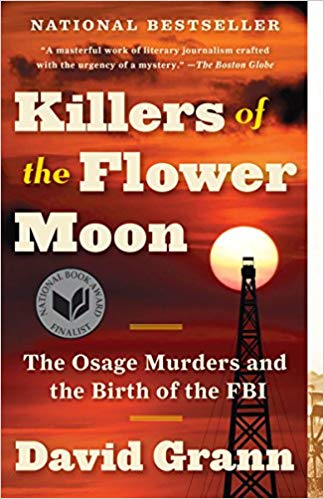 Purchase Killers of the Flower Moon from Amazon.com
Purchase Killers of the Flower Moon from Amazon.com
Retirement Game Changers: Strategies for a Healthy, Financially Secure, and Fulfilling Long Life
Reviewed March 2, by Jon. This book was remarkably similar to How To Make Your Money Last. It had similar advice albeit a slightly different perspective. It confirmed a lot of things that Jane Bryant Quinn said and was also a useful provocation for thinking about retirement. Even though it repeated much of what was in How To Make Your Money Last, it is always useful to get multiple perspectives that either confirm or challenge the basic framework.
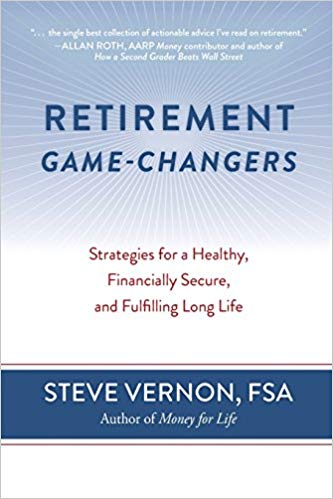 Purchase Retirement Game Changers from Amazon.com
Purchase Retirement Game Changers from Amazon.com
How to Make Your Money Last: The Indispensible Money Guide
Reviewed March 1, by Jon. This is a classic retirement planning guide. I’m reasonably savvy financially, but this book did provide a new lens – such as setting up retirement paychecks. It also provided insight into topics I don’t know much about such as annuities, reverse mortgages, social security, and medicare. There are sections I skipped because they weren’t relevant to us – such as divorce, passing an estate to heirs, and pensions. This was a good introduction to retirement planning and provoked some new thinking and the basis for a retirement framework.
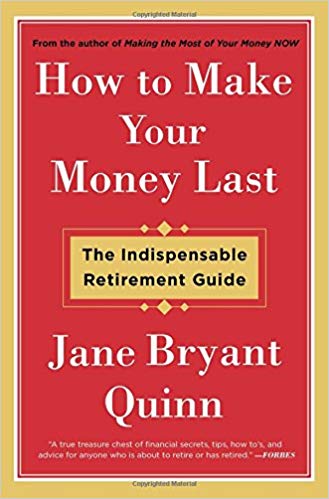 Purchase How To Make Your Money Last from Amazon.com
Purchase How To Make Your Money Last from Amazon.com
How Democracies Die
Reviewed March 1, by Jon. How Democracies Die is written from a historical and political science point of view to explain what happens when democratic institutions erode or are subverted. The authors describe how would-be dictators in a number of banana republics usurp control of democratic institutions such as the press, legislature, judiciary, and the electoral process. They then draw a parallel to the U.S. today. They state that the US was a successful democracy because our political leaders practiced forbearance – checking their own power in favor of the greater good. Forbearance was widely practiced between the great depression through the 60s. It came at a cost of implicit ignoring of racial inequality and civl rights. Like several other sources I have read, they point to Newt Gingrich’s mid 1990s Republican takeover of congress as the beginning of the decline in U.S. democracy – when politicians began to focus on winning at all costs rather than the greater good. The authors assert that Trump’s presidency is a symptom of an eroding democracy, not the cause. They are probably correct, but Trump’s behavior is a classic case of the kinds of things the erstwhile dictators they describe do to kill democracy.
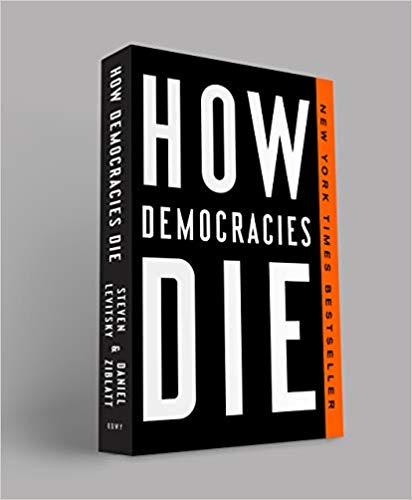 Purchase How Democracies Die from Amazon.com
Purchase How Democracies Die from Amazon.com
Can American Capitalism Survive: Why Greed it Not Good, Opportunity is not Equal, and Fairness Won't Make us Poor
Reviewed February 15, by Jon. This book talks about the dysfunctions of American capitalism - specifically the rise of income inequality. Perlstein asserts that inequality fundamentally reduces the performance of society. He diagnoses the causes that lead to a "winner take all" economy, specifically the overweighting of finance. He has a number of prescriptions to make a better capitalism:
- Limits on special interest money - probably requires a constitutional amendment
- Univeral Service + Universal Basic Income
- Sharing Profits with Employees
- Equalizing Educational Opportunity
- Reducing concentration, restoring competition
- Minimizing the maximization of shareholder value
I generally agree with both his diagnosis and prescriptions, with the possible exception of Universal Basic Income. This is pretty much liberal orhodoxy, but I believe the analysis is sound and so are the prescriptions. It is a well-written book.
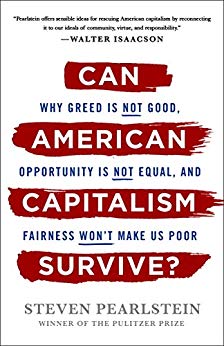 Purchase Can American Capitalism Survive? from Amazon.com
Purchase Can American Capitalism Survive? from Amazon.com
The New Leadership Literacies: Thriving in a Future of Extreme Disruption and Distributed Everything
Reviewed February 9, by Jon. This is the latest by Bob Johanson, the former leader and now distinguished fellow at the Institute for the Future. It plays on many themes he has developed over the years. Here are the five new literacies that Bob advocates:
- Forecast likely futures so you can “look back” and make sure you’re prepared now for the changes to come
- Use low-risk gaming spaces to work through your concerns about the future and hone your leadership skills
- Lead shape-shifting organizations where you can’t just tell people what to do
- Be a dynamic presence even when you’re not there in person
- keep your personal energy high and transmit that energy throughout your organization
All are reasonable literacies. The first, in particular, is something I strongly believe and correlates with A Spy's Guide To Strategy, that I read last fall. It is the essence of foresight and strategic thinking.
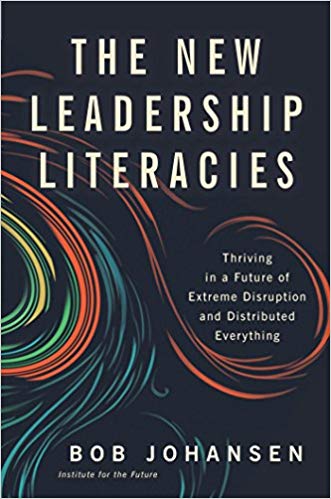 Purchase The New Leadership Literacies from Amazon.com
Purchase The New Leadership Literacies from Amazon.com
 China Rich Girlfriend
China Rich Girlfriend
Reviewed February 2, by Jon. This is the second in the Crazy Rich Asians trilogy. Like the first book, Crazy Rich Asians, this is a big-time candy read. It builds on Crazy Rich Asians with Rachel Chu and Nick Young going to China to meet Rachl's father. It is peppered with over the top Rich, clueless people consuming food, clothing, real estate, automobiles, and aircraft at an astonishng rate. The book is about everything that is wrong with radical wealth and income inequality. But it is entertaining as a work of fiction.
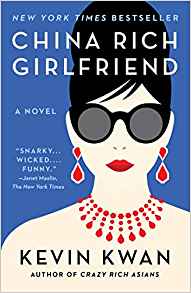 Purchase China Rich Girlfriend from Amazon.com
Purchase China Rich Girlfriend from Amazon.com
Marketcraft: How Governments Make Markets Work
Reviewed January 24, by Jon. Vogel, a professor of political science at UC Berkeley, starts by debunking the false dichotomy between free markets and government regulation. He makes the case that markets function freely only within an appropriate regulatory framework that protects against market failures, create a level playing field, and ensure transparency and fairness. He describes how these functions work and makes that case that only governments can provide the framework to make markets function effectively. I very much agree with his argument as I have long suspected that those who argue for totally unfettered markets are trying to profit at the expense of the rest of us.
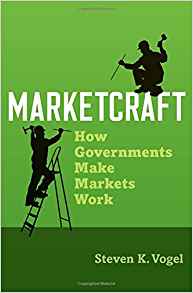 Purchase MarketCraft from Amazon.com
Purchase MarketCraft from Amazon.com
Enough: True Measures of Money, Business, and Life
Reviewed January 20, by Jon. John Bogle, founder of Vanguard and inventor of the index mutual fund, died this week. I’ve admired Bogle for a while and read a Washington Post opinon that said “Bogle made investors richer and the financial industry poorer”. That characterization squares with what I knew about Bogle so I decided to read on of his works – Enough. Enough is a straightforward book, written in 2009, right after the financial crisis that encapsulated his beliefs. Bogle believed that the financial industry had become self-serving and forgotten its duty to serve customers. He made a clear distinction between investing and speculation and believed long-term investing with low costs is what served customers’ interests best. Bogle certainly lived what he believed and was an iconoclast in the financial industry. He defined what it means to act with fiduciary duty. Enough cover the financial industry, business in general, and life. Bogle talks about being principles in all three. Enough is his final advice – not to just accumulate for the sake of accumulation, but to accumulate just enough. The world lost a great mind when Bogle died. I’m glad to have learned a bit more of his philosophy and found that It really resonates with me. It also made me happy that I’ve been a Vanguard investor throughout my adult life. I feel like we are in good hands.
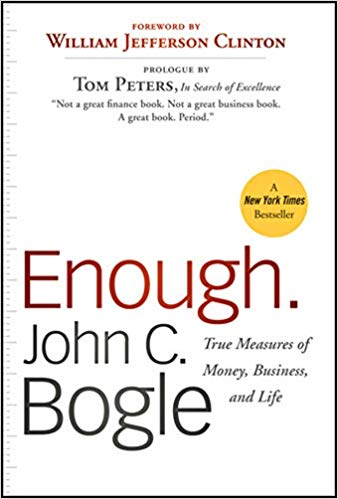 Purchase Enough from Amazon.com
Purchase Enough from Amazon.com
Sapiens: A Brief History of Humankind
Reviewed January 19, by Jon. Sapiens is the second Harari book I read, but it is first in his series before 21 Lessons for the 21st Century. As with 21 Lessons, Harari is very clear and lucid in his writing. Sapiens is, as the title says, a history of mankind from our evolution from the apes to the present day. The biggest insight I got from the book is that we are, biologically, animals with all of the hardwired capabilities and limitations afforded by biology. What separated homo sapiens from the other species (e.g. neandrathals) was what Harari calls a “cognitive revolution”. We were able to formulate and tell stories about the world that enabled us to mobilize large groups of us toward common purposes. This is something no other species could do. Harari is clear that our stories – which form the basis of our culture – are pretty arbitrary and have no basis in biology or history. Stories like Christianity, science, capitalism, communism, and liberalism are all arbitrary. He stands in stark contrast to fundamentalists who claim, for example, that there are inherent “laws” of capitalism or liberal society. They are all stories which have varying degrees of utility. Sapiens covers a huge arc of history while reinforcing these basic themes. Harari ends the book with the unsettling idea that immutable biology is on the verge of becoming mutable. First through genetic engineering, which we have been doing for a while, then through direct manipulation of DNA, the very code of life. He postulates that we actually are on the verge of “intelligent design”, but not the version imagined by religious fundamentalists. Finally, the rise of cyborgs and artificial intelligence blur the immutable line of biology. I highly recommend Sapiens and look forward to reading the final book in his trilogy – Homo Deus – which will, I assume, pick up where Sapiens left off.
 Purchase Sapiens from Amazon.com
Purchase Sapiens from Amazon.com
When Your Life Depends on It: Extreme Decision Making Lessons from the Antarctic
Reviewed January 7, by Jon. This book used the expeditions of the Antarctic Explorers to teach life lessons. Much of the book is about Shackleton and his expeditions. Purely by coincidence, I watched a documentary about Shackleton right before I started this book (not pure coincidence) I was shipboard returning from a trip to Antarctica. The book weaves stories about the expeditions with decision making style. It is very readable and interesting. It concludes with 7 strategies for decision-making:
- Meet every decision head-on
- Make the best of a bad decision
- Engage Others on your team
- Inspiration can come from unexpected places
- Never, ever give up
- Reframe what success looks like
- When all else fails, bad luck descend, and the end is truly in sight, how do you act nobly?
They illustrate each strategy with examples. The book is a pretty light read – but does give a sense of what the Antarctic explorers confronted and how they dealt with it.
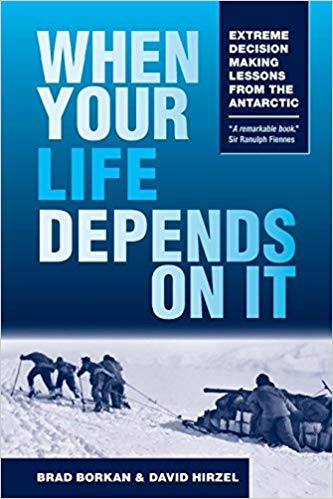 Purchase When Your Life Depends On It from Amazon.com
Purchase When Your Life Depends On It from Amazon.com
Us. Vs Them: The Failure of Globalism
Reviewed January 5, by Jon. Bremmer is a globalist but he readily acknowledges that globalism has not lived up to its promises. A fundamental premise is society and countries often devolve into us vs. them thinking and demonize the other. Globalism has allowed this to happen and Bremmer posits that it is a natural consequence of the failures of globalism. I did not find a lot of new insight here but perhaps the most useful was a discussion of the various roles governments might play. Bremmer’s book did reinforce my belief that pure market capitalism has failed, as has unfettered globalism. We do need a new understanding of who we are together and the role government plays in knitting us together.
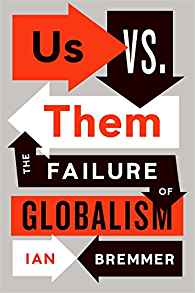 Purchase Us vs. Them from Amazon.com
Purchase Us vs. Them from Amazon.com
The Once and Future Worker: A Vision for the Renewal off Work in America
Reviewed January 3, by Jon. I liked the overall premise of this book – that we pay too much attention to consumption and not enough to ensuring productive capacity. The idea is that we should pay more attention to making people productive and ensuring good jobs. So far, so good. The problem is that Cass, the author, quickly devolves into standard conservative ideas – such as reducing regulations on pollution (the idea being that a clean environment is somehow “consumption”. He also had some dubious casting of everything he disagreed with as “consumption” and everything he likes as “production”. There were few really new ideas here – mostly traditional conservative views reskinned around productivity. He did have good but not really new ideas about education and some provocative ideas about the role of labor unions. I was looking forward to reading this book because I thought it would have some new ideas – from the right. Instead, it was mostly a rehash of standard conservative ideas. The author also diminished his message with some unnecessary snarkiness about liberals – which made it hard to take the book seriously. I was disappointed that the book did not live up the promise of its premise, which I did find provocative.
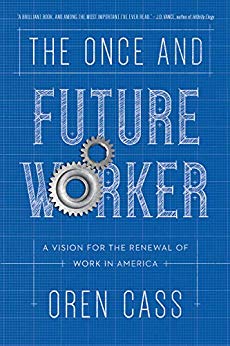 Purchase The Once and Future Worker from Amazon.com
Purchase The Once and Future Worker from Amazon.com
Why We Sleep: Unlocking the Power of Sleep and Dreams
Reviewed January 2, by Jon. Why We Sleep explains the scientific evidence on how we sleep, what helps or hurts sleep, and why we sleep. Walker makes the assertion that we are a chronically sleep-deprived society and makes the case for most people getting more sleep, ~ 8 hours per night. He talks about business and public policy approaches to value and reward sleep more. I buy his argument but would have liked more specific ideas about how to better manage sleep. It sounds like insomnia has some common causes – which I’d like to see him address. I have no quarrel with his argument, but his prescriptions seemed weak.
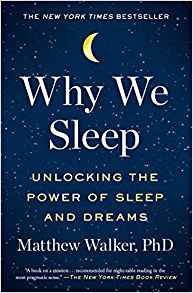 Purchase Why We Sleep from Amazon.com
Purchase Why We Sleep from Amazon.com